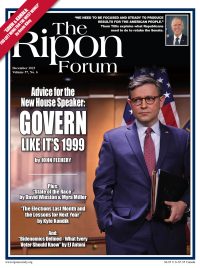
In 1999, Congressional Republicans, facing daunting poll numbers after a failed (and unpopular) attempt to oust President Clinton through impeachment, decided to go positive.
Newly-elected Speaker of the House Denny Hastert and Senate Majority Leader Trent Lott coordinated to launch a four-point agenda to “Secure America’s future.” They promised to protect Social Security from rapacious spending by the Clinton Administration (the term lock-box popularized by Al Gore actually started with Congressional Republicans.)
They also promised to pursue an aggressive agenda to improve the nation’s schools with testing requirements tied to more federal funding. They promised to grow the economy with pro-business and pro-family tax cuts (abolishing the marriage penalty and death tax became very popular in 1999 and 2000). And finally, they promised to strengthen national defense, which Clinton had pared back in the post-Cold War peace dividend era.
This four-point agenda was simple. It resonated with voters. It gave the House and Senate something to work on together (which was a rarity back then and almost unheard of now). It also allowed the Republicans to talk about something else — anything else — other than impeachment. It provided some proof that the GOP could offer something of a governing philosophy that didn’t repel a wide swath of the country. It repaired the tattered brand of the Republican Party. And it helped to prepare the country for the compassionate conservative agenda of George W. Bush.
In 1999, Congressional Republicans, facing daunting poll numbers after a failed (and unpopular) attempt to oust President Clinton through impeachment, decided to go positive.
On each of these items and others, including a plan to modernize the Medicare program with a prescription drug benefit, House and Senate Republicans made substantial progress, holding hearings, introducing legislation, considering some of the bills on the House and Senate floors, even getting a few to President Clinton’s desk (where he vetoed them). The purpose of the effort was not necessarily to make new laws, but neither was it to mindlessly waste the time of the American people and their elected representatives. The purpose was to provide the voters with a stark contrast in governing philosophy between the two parties, but to do so in a respectful and diligent way. And of course, it was also to condition Republican lawmakers to the idea that the GOP was no longer going to be the party of “no.” We were going to work to get solid accomplishments for the voters and do so in a way that would reflect conservative governing principles.
Over the last two years of the Clinton Administration, Hastert and Lott found a way to make compromises and bring the country together, which didn’t seem possible after the bitterness of the impeachment fiasco. The government didn’t shut down, not even once. Most of the spending bills were done in regular order. Important bipartisan legislation that helped to create the world we live in today — from the Gramm-Leach-Bliley Financial Services Act to PNTR (permanent normal trade relations) for China — was negotiated by both sides, passed and signed into law by the President. And Hastert was able to do all of this with the same numbers that Mike Johnson has today.
The purpose of the effort was not necessarily to make new laws … The purpose was to provide the voters with a stark contrast in governing philosophy between the two parties, but to do so in a respectful and diligent way.
Here’s the point — having an agenda matters. Making the most of your time in the majority gives the voters a reason to keep you there. It is vitally important the House and the Senate work together to achieve that agenda. If one body goes off and does its own thing, it does the members no good. The voters don’t care about politics. They care about results.
Here is my advice to the new Speaker — come up with a simple agenda that resonates with voters. In 1999, we called it Securing America’s Future, but this is a different time and the stakes are completely different. I would call it the Protecting the American People agenda. Protect them from Biden inflation. Protect them from mindless crime. Protect them from fentanyl. Protect them from stupid regulations. Protect them from the nanny state. Protect their freedom, their pocketbooks, and their families. And then convince your colleagues in the Senate that it is better to work together on a positive agenda than it is work separately on no agenda.
Elements of that agenda might not get signed into law by President Biden, but I betcha that President Trump, DeSantis, or Haley would be happy to sign legislation that protects the American people from the worst excesses of the Biden years.

We did in 1999. You can do it in 2024.
John Feehery is Partner of EFB Advocacy, a boutique lobbying and strategic advocacy firm on Capitol Hill. A former aide for the House Republican leadership, he is also a member of The Ripon Forum’s editorial board.




